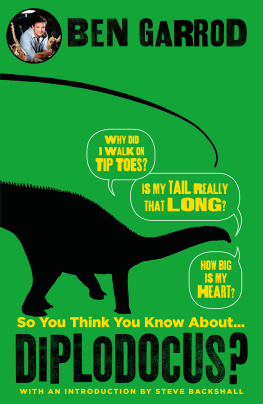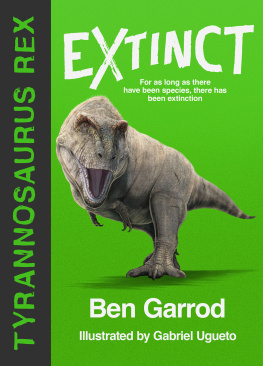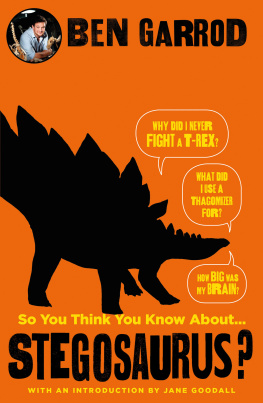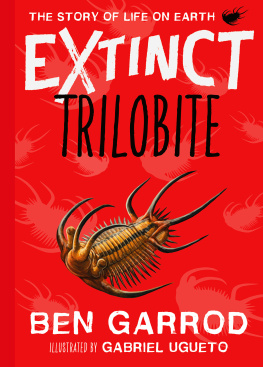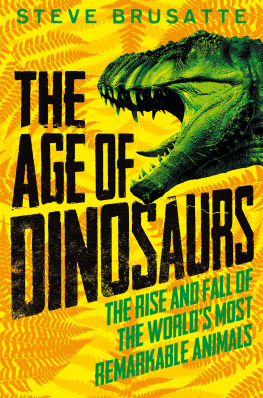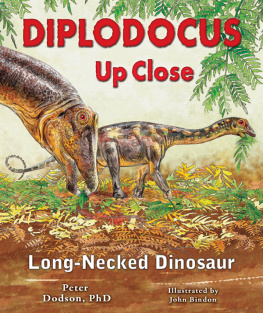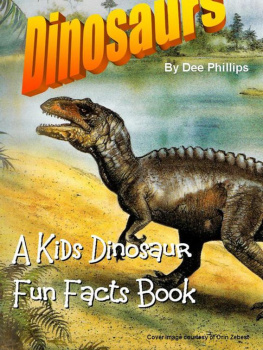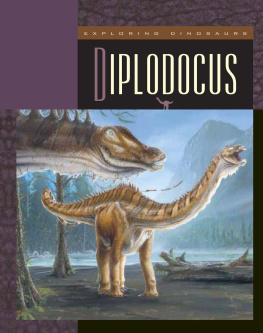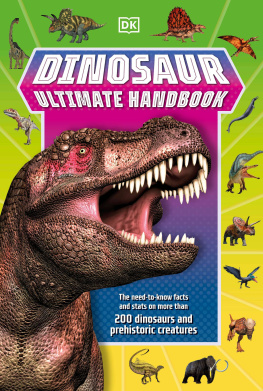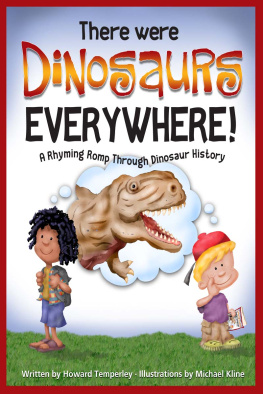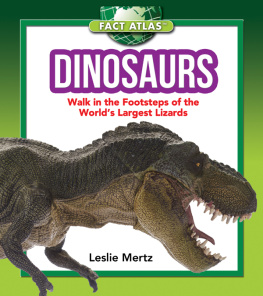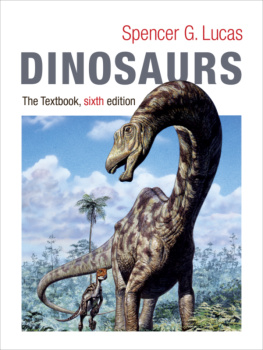SO YOU THINK YOU KNOW ABOUT DIPLODOCUS?
Ben Garrod
www.readzephyr.com
Ben Garrod's So You Think You Know About Dinosaurs? is fun, funny and informative. This highly collectable, pocket-size series is the most up-to-date in 66 million years, featuring Tyrannosaurus rex, Diplodocus, Triceratops, and introduced by Steve Backshall.
Did you know that not all dinosaurs are green and scaly, some are ginger and feathered, or that they didnt all roar, they cooed like pigeons, or that the ultimate prehistoric predator is actually not a dinosaur? TV scientist, Dr Ben Garrod, is proud to be a geek as he mixes hard science and humour to prove that science is for everyone. All children know their dinosaurs but Ben encourages them to think differently, revealing how new discoveries and breakthroughs occur in science every day. By looking at the evolutionary arms race, prey, predators, place, time, groups and species, Ben reveals new-look dinosaurs. Palaeo art by Scott Hartman and Gabriel Ugueto and cartoon illustration by Ethan Kocak.
CONTENTS
ASK AN EXPERT : COULD A BRONTOSAURUS
SIT ON YOUR LAP?


Dr Boneboy Ben is a very special geek indeed. Not a week goes by when I dont get on the phone to ask Dr Ben a question about obscure, strange aspects of biology, and he always has the answers. The reader of this book is very lucky to have such a terrific teacher!
The study of science makes sense of everything in our world. Science makes everything work, and the genius scientists behind technology genuinely are the most powerful people in the world
by Steve Backshall

Palaeontology, or dino-science, is not just about unearthing old stone bones, its about understanding our planet, and everything that has ever lived on it. By bringing it to life for a new generation, Dr Ben is connecting you to our past, and making you a part of the knowledge of our future. As he says, there is nothing wrong with being clever; you should embrace your inner geek, and see the world as a puzzle waiting to be solved
Enjoy the adventure.



You know when you love something and cant remember when you first started liking it? Well, its like that with me and science. Now Im a scientist and I study animals and do TV programmes, but actually I can still remember the very first time I started to like science.
I was about three years old and staying with my grandparents. My granddad, George, used to take me for walks on the beach, looking for shells and other things from the sea. I remember wed just got home, it was raining and there were lots of little red worms on the garden path. I asked where they came from, because Id never seen them when it wasnt raining. He said they were from the moon (now I realise this wasnt true) and I remember wondering how they got there, where they went when there was no rain and what they ate, with mouths so small.

My point is that you can love science even when youre really young and even if you dont know much about what youre looking at (like me and the moon worms). Science is cool because we can ask question after question after question and the more we discover, the more we have still to ask . So, if youre reading this and you love dinosaurs, it might be your first step to becoming a palaeontologist (a scientist who studies dinosaurs), a doctor, an astronaut (check for moon worms for me) or even a shark biologist.
That moon worms day was the first step for me in becoming a scientist. For you, it might be finding a fossil on a walk, seeing your pet do something weird or watching a meteor shower and thats it, youre hooked. Then, keep it up. Keep reading about science or collecting things or going out and exploring because believe me, it gets better and better.

Youre never too young to begin. I started a creepy-crawly zoo when I was about five. I had spiders, centipedes, pill bugs and even a very grumpy devils coach horse, all in separate jars. I fed them, drew them in my notebook and released them safely, but for me, it was like capturing tigers, wolves and cobras. When I was about ten, my teacher brought in owl pellets and we looked at the bones inside to see what the birds had been eating. If you love science and do sciencey things for fun, then you, my friend, are a scientist it doesnt matter whether youre nine or ninety.
Now Im an actual scientist and its great. I have a job thats cool and makes me happy. Ive lived in Africa, working with wild chimpanzees, studied coral reefs in Madagascar, and followed walruses up on Svalbard in the Arctic. Ive helped save Sumatran orangutans in Indonesia and lived in the Caribbean, studying monkeys. Ive watched teams dig up giant dinosaur bones in Argentina and Ive seen scientists drill into the asteroid core that led to the end of the dinosaurs. Every day, I wake up and look forward to new adventures .
I still have as many questions about science as I did when I was growing up. My series So You Think You Know About Dinosaurs? looks at all the best-known dinosaur species as well as random weird ones and uses some of the most modern and interesting science to reveal how your favourite dinosaurs ate enough food every day to fill a skip, how they hunted in the dark and why some predators turned vegetarian. Amazing discoveries will show us what dinosaurs looked like, what colour they were and even what sounds they made. You are young scientists, so Ive included the most up-to-date research and used some complicated terms. Well tackle some difficult ideas, because I reckon you guys can handle it.
So, let's take a look at what life was like in the time of the dinosaurs.
Let's get geeky!


Imagine a conversation between you and your teacher. Maybe he knows a lot about dinosaurs but maybe not as much as you.


